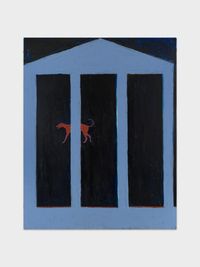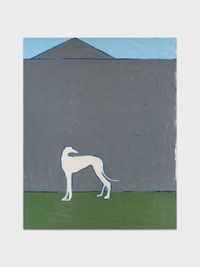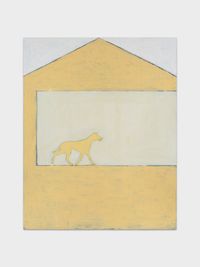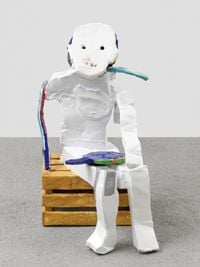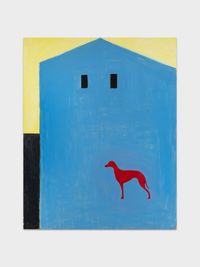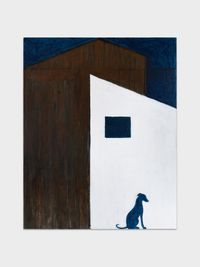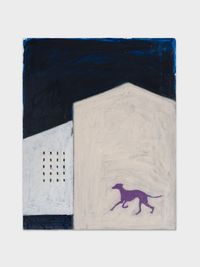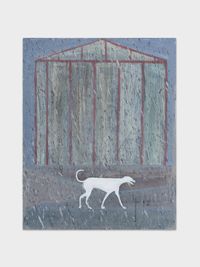Swiss contemporary artist Valentin Carron is known for sculptural works that appropriate cultural symbols, forms, and well-known artworks, to question the legacy of tradition.
Read MoreCarron represented Switzerland at the 55th Venice Biennale in 2013.
Born 1977 in Martigny, Switzerland, Valentin Carron attended the Cantonal School of Fine Arts in Sion from 1992 to 1999, followed by the Lausanne School of Fine Arts.
Carron's humorous works appropriate existing objects and cultural symbols, often replicated in a different material, including iron shop signs, crucifixes, and musical instruments.
Carron's main inspirations include public artworks, works in Swiss museums and foundations, and natural landscapes, notably from his home, the Swiss canton of Valais.
At the 55th Venice Biennale in 2013, where Carron represented Switzerland, the artist showed readymades mixed with ideals of traditional Swiss landscapes, or images the Swiss authorities fabricated to increase tourism and strengthen national identity.
As such, Carron brought nationalism and capitalistic structures into conversation with notions of authorship and originality, raising questions around the ideas and objects that are passed down and conserved, and who they ultimately benefit.
Attesting to the cultural shifts of his times, Carron's practice of recovering existing cultural ideas and objects and looking at their significance in the present, introduces elements of pop culture and kitsch to question the relevance of tradition in times of mass-production.
Sculptural works like the polystyrene and resin cast figure L'oiseau fou (after Pellegrini) or the bronze and wood Bell, 2013 (For Parkett 93) (both 2013), shift the authority and charge of the stone sculpture and the Swiss nationalist symbol by rendering them in lightweight materials, integrating both into the fabric of everyday life.
Carron was accused of plagiarism for replicating a steel artwork by Francesco Marino di Teana, L'Aube from 1977, in polystyrene, fibreglass, and acrylic resin, in a work titled The Dawn (2014), which showed with Eva Presenhuber at FIAC in 2014.
Di Teana's son noted the very exact nature of the copy, while Carron affirms that he only sought to 'replicate the emotion this work provoked.' The artist has said that his appropriations are not a question of copying but interpreting the vernacular of artistic forms.
Others stood behind Carron's work, noting the difference in material, the intentionality of the title, as well as the legitimacy of the act itself, which had been employed by the artist's former professor John Armleder.
In 2015, Carron curated the group exhibition Work Hard: Selections by Valentin Carron at the Swiss Institute with a suite of 'off-modern' works including surrealist drawings from 1919, a kinetic wall piece by Jean Tinguely, and a 1967 chair with a neon back and legs—all of which countered the visual language commonly associated with post-war art.
The walls of the Institute were painted a neutralising grey for the occasion, rather than the typical white, rather than highlighting the individuality of separate pieces, instead housing the selected works in a context of their own, very much grounded in the present, as with Carron's appropriations.
Carron was the recipient of the 2015 Overbeck Prize for the Visual Arts, the 2001 Eidgenössischer Kunstpreis, the 2000 Prix fédéral des Beaux-Arts, the 1999 Prix Odette Steinmann, and the 1999 Prix de la Fondation Ernest Manganel.
Carron's works have been shown widely in Europe, the U.K., and the United States.
Solo exhibitions include: Wilde Gallery, Geneva (2022); Galerie Eva Presenhuber, New York (2022); Museum im Bellpark, Kriens (2021); Le Consortium, Dijon (2020); 303 Gallery, New York (2019); Noir Contemporary, Turin (2019); Galerie Kamel Mennour, London (2019); David Kordansky Gallery, Los Angeles (2016); and 55th Venice Biennale, Swiss Pavilion (2013).
Group exhibitions include: Cassino Projects, Milan (2021); Musée d'art moderne et contemporain, Geneva (2021); Centre Pompidou-Metz (2020); Museum Haus Konstruktiv, Zurich (2019); Swiss Institute, New York (2018); Pace Gallery, New York (2014); LUMA Foundation, Switzerland (2014); and Palais de Tokyo, Paris.
Valentin Carron's Instagram can be found here.
Elaine YJ Zheng | Ocula | 2022
